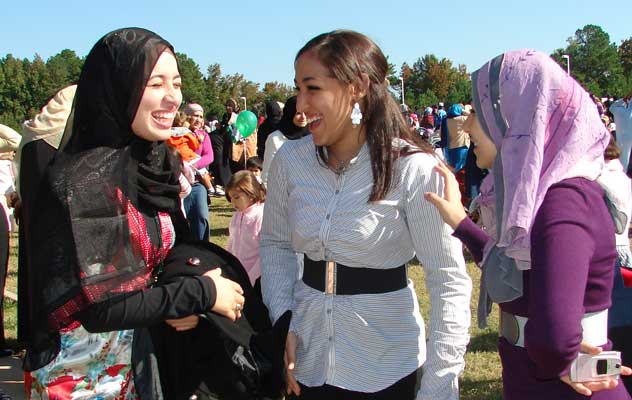It started like any other day.
Amy Klooz was taking a test when the hunger pains hit her. She’d normally find a water fountain or buy a Coke, except this day was different.
She was fasting for Ramadan and was prohibited from eating or drinking anything until the sun set.
This year, Ramadan was Sept. 23 to Oct. 22. Ramadan is the ninth month of the Muslim calendar where fasting, praying, charity and self-accountability are emphasized.
During this time, Muslims fast during daylight hours. They abstain from eating or drinking anything, even water, and do not take any medicine or have sexual relations. The old, the sick, the mentally ill, women during menstruation, travelers and pregnant women are exempt from fasting. Those who are able to must make up the days they missed throughout the year before the next Ramadan. If they are unable to do so, for every day they miss of fasting, they feed one hungry person.
They eat a small breakfast with family before sunrise. After sunset, they break their fast with friends and families and usually have big feasts. They also pray the regular prayers five times a day, as well as extra nightly prayers and read a portion of the Quran every night.
Klooz, a senior in electrical engineering, was a Christian who converted to Islam last June.
“I read the Quran and I really believed in what it said,” Klooz said. “I believed that it is the word of God so I decided to become a Muslim.”
She said her decision to become a Muslim wasn’t immediately popular with her family, who is Protestant Christian.
Klooz said the decision would be hard for any Christian family to deal with, especially since Islam has received a lot of bad press recently.
“In some ways [though], they were supportive,” Klooz said.
She said her family avoids cooking pork whenever she eats with them out of respect for her religion.
Klooz said the tasks of Ramadan can be daunting, but she has never considered turning back.
“At first, fasting is hard. The first couple of days are really difficult because your body doesn’t understand what you’re trying to do,” she said. “It’s a long time to go without food, especially if you have addictions like caffeine, because you have a headache that lasts for a couple of days.”
She said she found it difficult to concentrate on tests and homework. The lack of food caused her to feel very weak and to lose energy.
“After a while, you get used to it. I usually got hungry at one point in the day, but every day it got easier,” Klooz said. “I started on a Saturday and the weekend was rough on me. Four or five days later I was doing a lot better.”
She said she received a lot of support from various sources. Her roommate, also a converted Muslim, woke her up for prayer and morning meals. The Muslim Students Association and other Muslims in the area offered her support.
Klooz said there are many misconceptions related to Ramadan. Many think that the purpose of fasting is for physical purification, but rather, it is for spiritual reasons.
“The biggest misconception is that Muslims have to fast and not do anything else in their religion and that’s not true,” Klooz said. “When you are fasting, it is important to mind your behavior and fast in your speech and actions, so that you’re acting better and being a little more conscious.”
Klooz said she has learned many lessons during Ramadan, including how to maintain her own behavior and to become more self-aware, so she can improve herself. She said what she will miss most of all is the sense of community she felt during the entire period.
“It’s really helped me to appreciate Islam in a new way,” Klooz said. “I’ve been around other Muslims and I’ve learned how to support other people. I’ve tried to become a better example and to make myself a representative of the religion.”








